A Letter to Hong Kong's Financial Secretary on the 2025-26 Budget
My open letter to Hong Kong's Financial Secretary on the 2025-26 Budget.
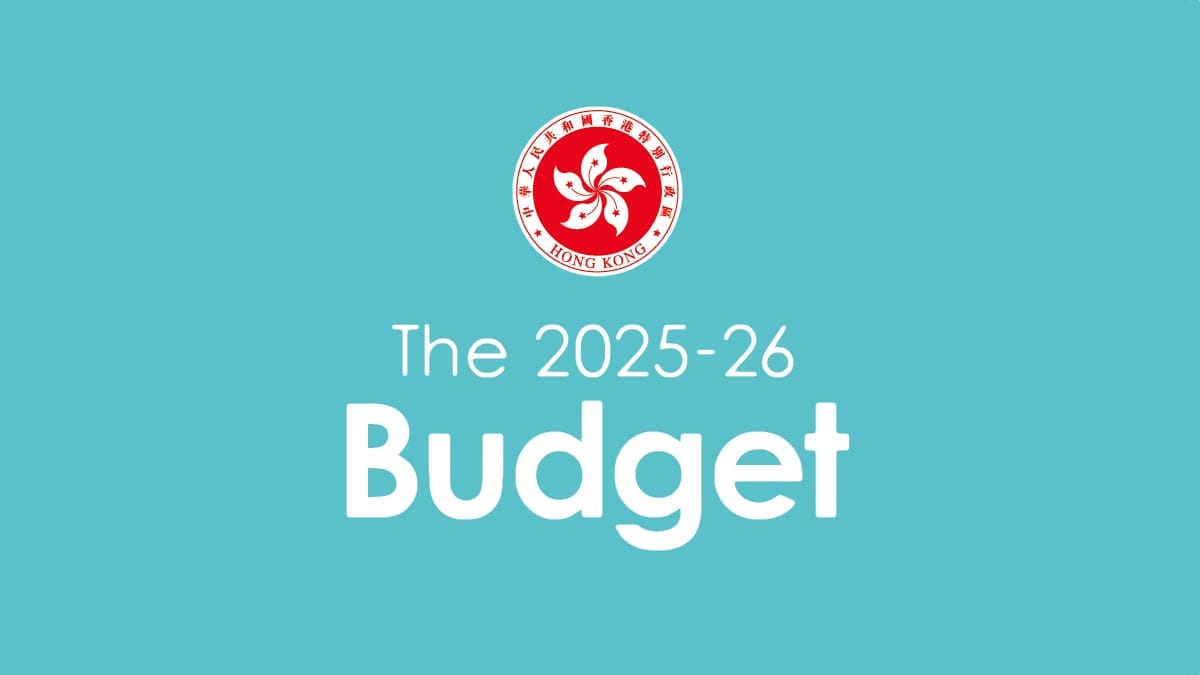
Last month, Hong Kong's Financial Secretary started a public consultation for the 2025-2026 budget. A long time Hong Kong Resident, I've been concerned about financial state of the Hong Kong Government over the past few years. Expenditures have been growing much faster than revenue and the Government is now running a deficit and consuming its fiscal reserves. This is unsustainable.
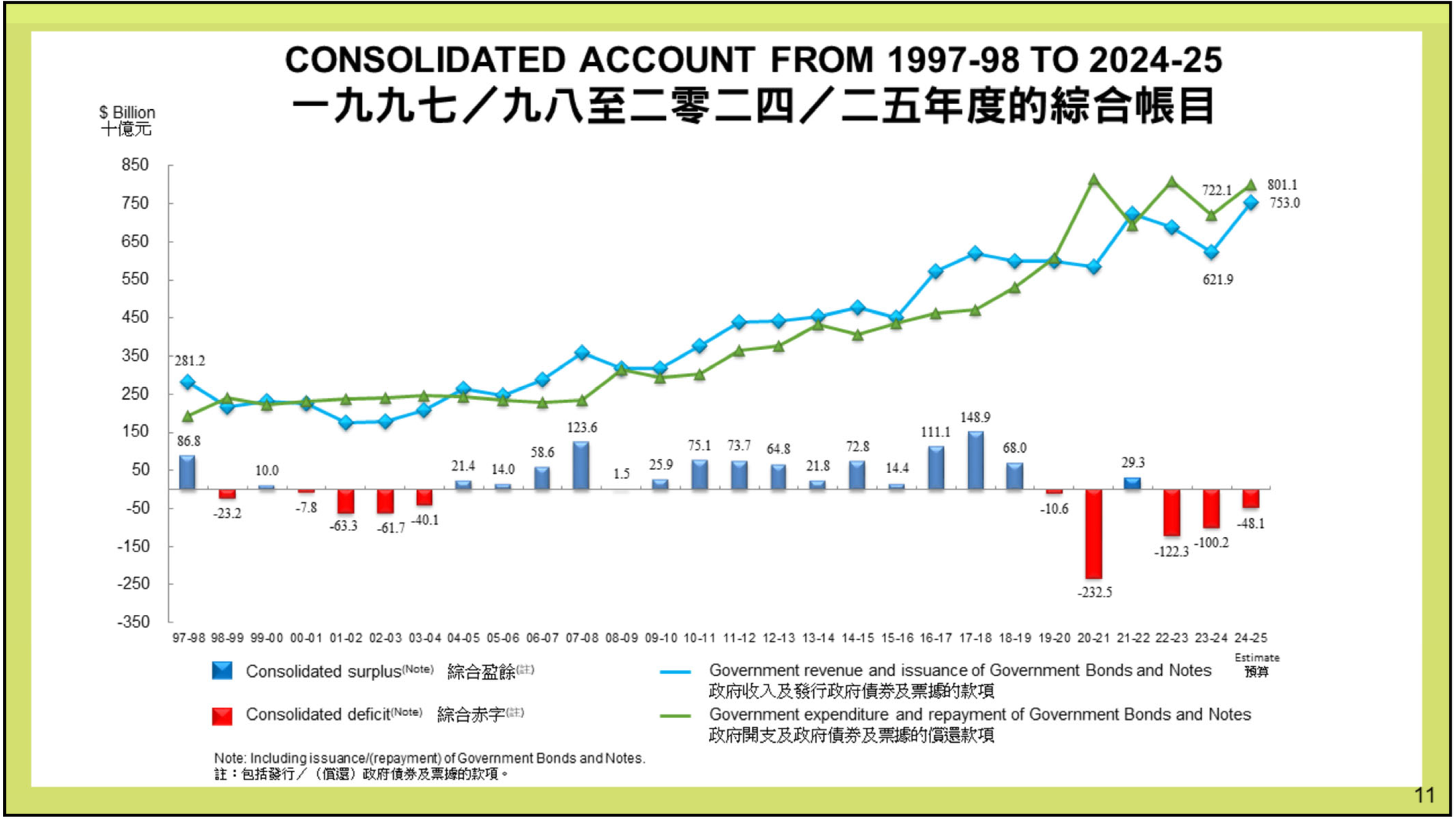
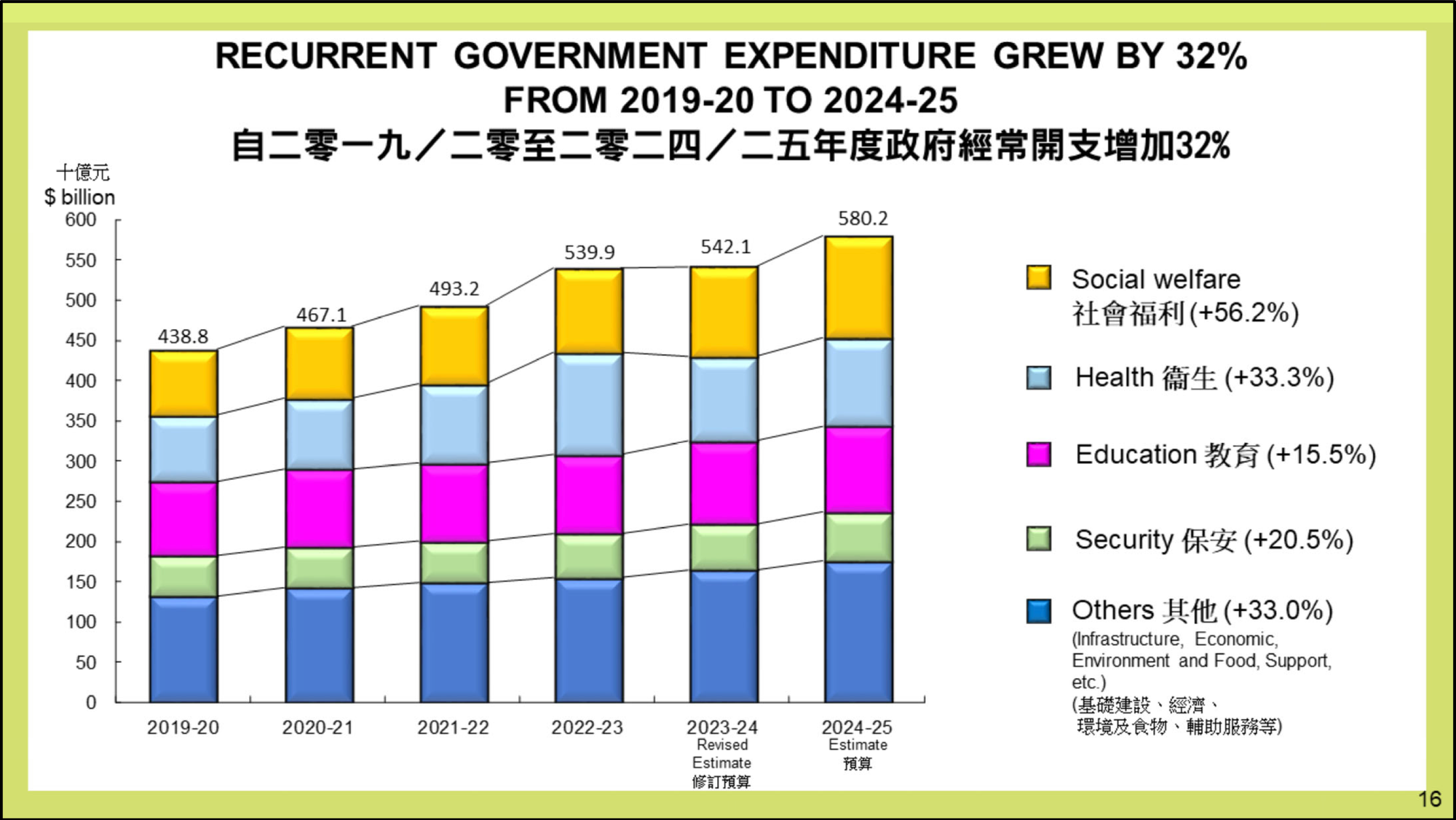
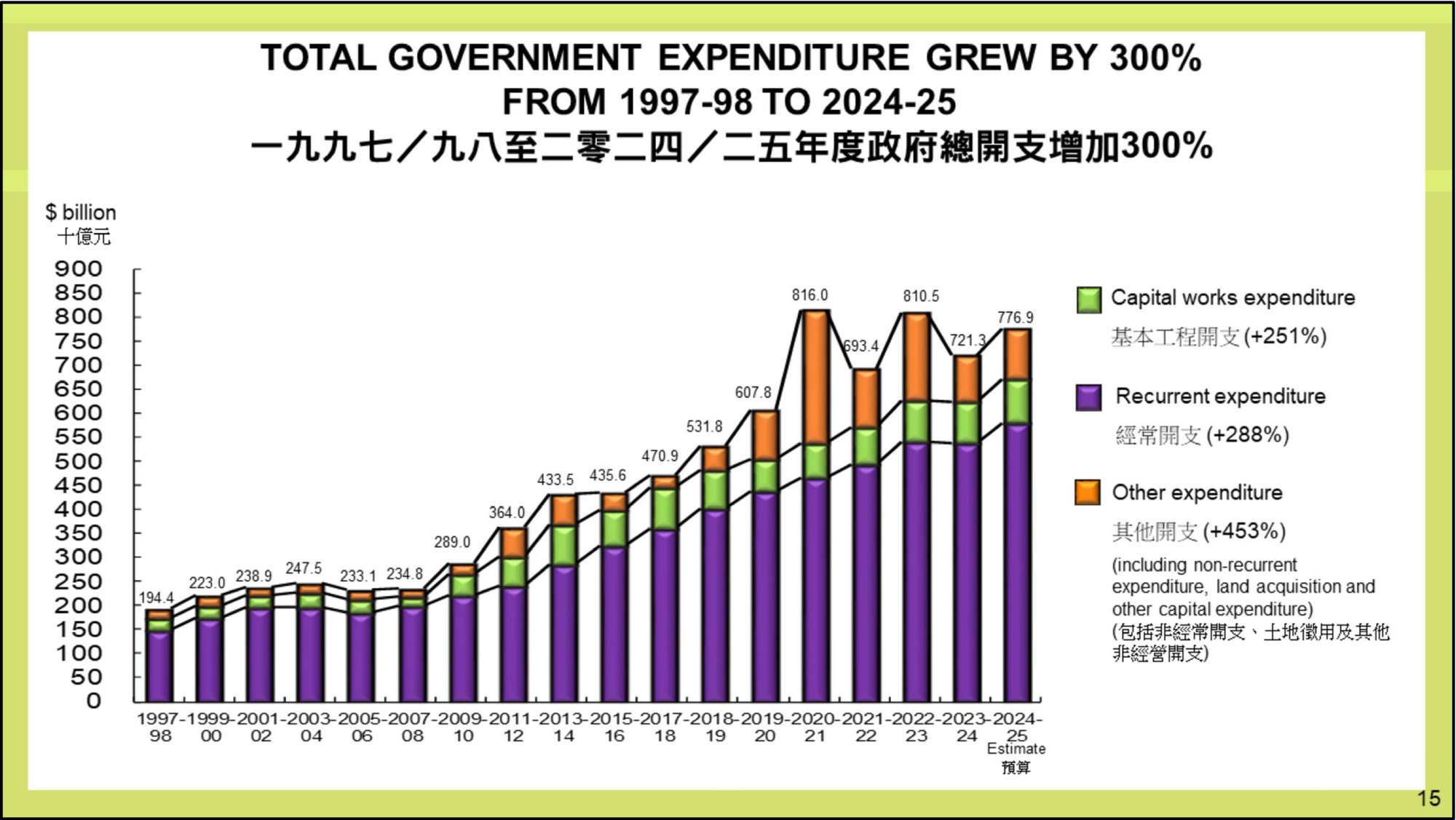
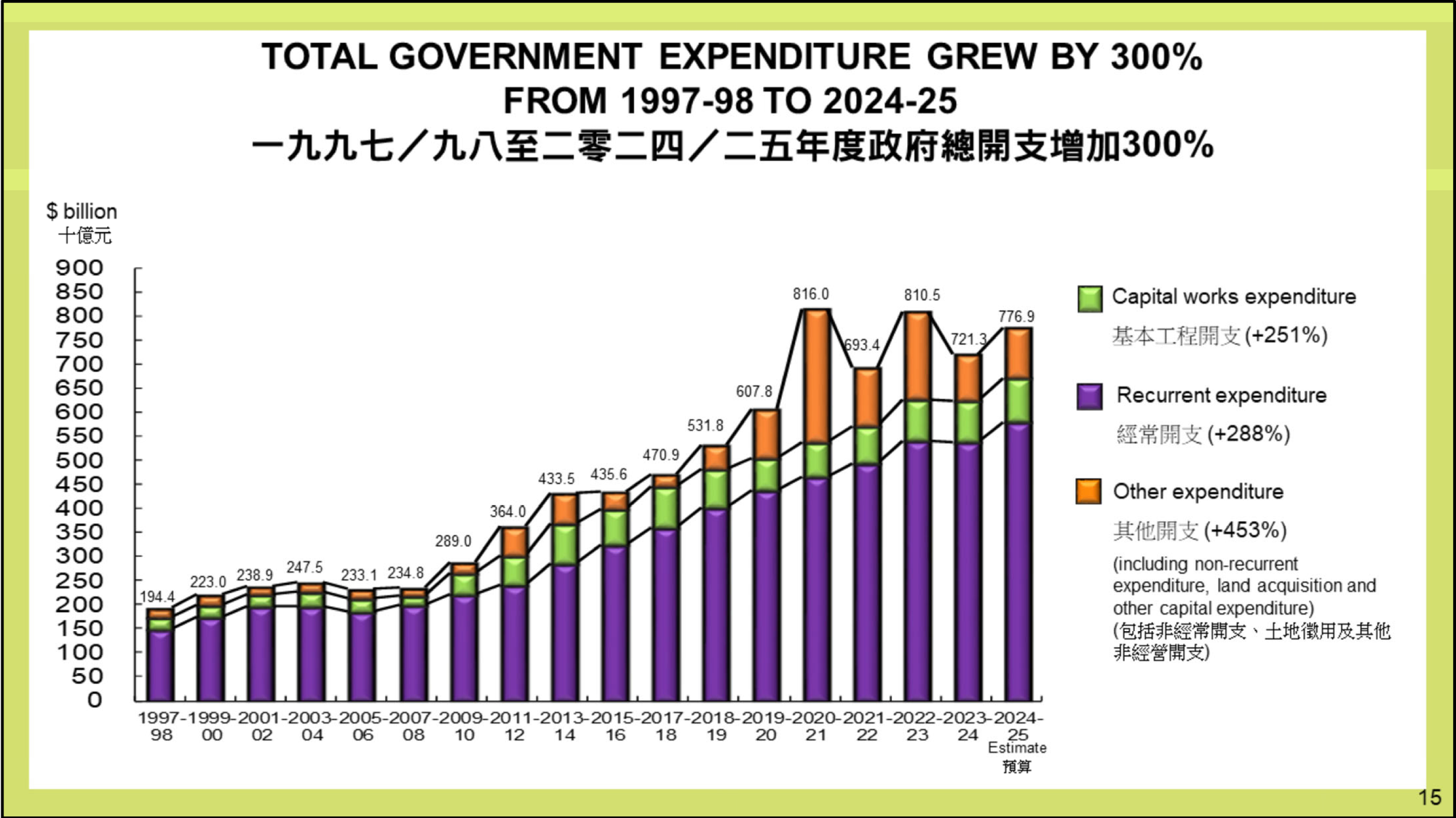
Hong Kong Government financials. Source: Government of HKSAR
Because I'm really happy living here and would like to keep being happy living here well into the future, I wrote a letter with some constructive advice on how to make the public finances more sustainable.
In the interest of public discussion and civil society, I'm publishing a scan of my letter below with the text to follow:
RE: 2025-2026 Budget Public Consultation
Dear Mr. Chan,
I write to you regarding your request for input on the 2025-2026 Hong Kong Budget.
I moved to Hong Kong in 2010 via what is now called the "Investment as Entrepreneur" visa scheme, attracted by its unique quality of life, efficient and low cost business environment, low tax environment, efficient government, status as the freest economy in the world and unique position as a Special Administrative Region of the People’s Republic of China.
Over the years, I've started two businesses in Hong Kong and co-founded the Bitcoin Association of Hong Kong, the oldest Bitcoin advocacy group in Hong Kong and one of the longest operating in the world. Fifteen years later, I am still happy and proud to call Hong Kong my home, having become a Permanent Resident.
It is with great concern that I've watched the Government's fiscal situation deteriorate over the past few years and wanted to share some of my thoughts as to how you might improve the management of the public finances:
Return to the user-pays principle
Traditionally, it was the well-established policy of the Government to operate on the "user-pays" principle which ensures that the costs of providing public services don't fall on the taxpayer alone. While this principle has never been strictly followed across the board, issues such as public affordability and other policy concerns have factored in to the Government's decision to price services at full or partial cost recovery, it has nevertheless been a guiding principle for the decades.
Recent administrations, however, perhaps emboldened by over a decade of budget surpluses have, drifted from this policy. Many user fees haven't been increased in many years despite significant increases in the costs to the Government to provide these services.
As a personal example, during my decade and half of residence, if memory serves correctly, the entrance fees for public swimming pools, of which I am a frequent user, have only increased in price once and stand at $17 and $19 for weekday and weekend entrance respectively. When I moved to Hong Kong from Guangzhou in 2010 this was already less than half the price for entrance to a public pool in that city and today it is significantly less than the fees one pays to access public pools north of the SAR boundary.
The Government should conduct a thorough review of the pricing of public services and adjust them upwards to reflect the increasing cost environment to ensure closer adherence to the "user-pays" principle.
Tie public service subsidies to financial situation
Generally, subsidized public services are provided at the same price for all residents irrespective of their needs or ability to pay. The main large scale exception to this, the Government Public Transport Fare Concession Scheme for the Elderly and Eligible Persons with Disabilities, instead ties eligibility to age for most users.
Instead of providing heavily subsidized services to all residents or to an age-based cohort of residents (a cohort which owns most of the property and wealth in the city), the Government should instead only offer subsidized public services to those residents who need it. "Need" could be defined as those eligible for public housing or someone receiving Comprehensive Social Security Assistance (CSSA).
Enact Two-tiered Hospital Authority Fees
Hong Kong's high quality public health care system is a cornerstone of our society. Unfortunately, the current financial arrangement where all residents are eligible for almost free care in public hospitals paid for by the Government is not sustainable due to our aging population. While the Government has recognized this problem and provides incentives to buy private insurance through the Voluntary Health Insurance Scheme tax incentives, more steps are needed to encourage those that can pay for their own health care to do so.
The Government should consider significantly increasing public health care fees for residents that aren't eligible for public housing or CSSA. These fees could be rolled out progressively over multiple years so that the public has an opportunity to make preparations. It would also give the private sector a chance to develop additional Tertiary hospital services that have typically been not available in Hong Kong because of competition from the free services provided by the public sector.
Reduce public transport subsidies
Prior to the decision of the previous administration to roll out the Public Transport Subsidy Scheme, Hong Kong was proudly one of the few places in the world where public transport was paid for by the people that use it. There was no solid public interest in ending "user-pays" transport practice and the cost to the Government is not sustainable. The Government should immediately end population-wide transport subsidies along with phasing out of the age-based Government Public Transport Fare Concession Scheme for the Elderly and Eligible Persons with Disabilities, and replace both by targeted subsidies only for those in need.
Increase vehicle fines
Hong Kong's $320 fixed rate traffic penalty hasn't been increased in 30 years and is so low that it provides little incentive to not park illegally on streets. The Government should increase traffic penalty fees by 5x for first time offenders and 10x or more for repeat offenders. This would either increase government revenue or reduce the illegal parking problem that further congests are already overcrowded streets.
Increase vehicle fees, institute vehicle congestion pricing and increase road tolls
Despite the high first vehicle registration tax, Hong Kong's roads are increasingly overcrowded despite having the best public transport system in the world. The Government should significantly increase annual vehicle registration fees so that the disincentive for vehicle ownership is ongoing and not one time. The Government should also institute congestion pricing in busy areas like Central/Western District and Wan Chai and significantly increase tunnel fees territory-wide.
These policies would deter growth in Hong Kong's private vehicle fleet and ensure that the 'user-pays' principle is followed, potentially increasing government revenue. Reduced vehicle traffic would make busy areas of Hong Kong more pedestrian-friendly, which in turn would drive foot traffic growth for local businesses and make Hong Kong a more attractive place to live.. It would also increase traffic speed for vehicles that still need to use the roads which is good for business.
Make Hong Kong more friendly for bitcoin and crypto
Prior to the COVID-19 pandemic, Hong Kong was seen as the global center of the crypto industry because of its free economy and freedom from major regulation. While some regulation was likely inevitable, the policies enacted by the Government specifically with regards to licensing have discouraged major global players from expanding here. The Government should revisit its regulations and revise them to be less invasive and more light touch, start up and business-friendly so that Hong Kong can regain its competitiveness with places like Singapore and the United States under the upcoming Trump Administration.
Consider diversifying government financial assets with Bitcoin
Geopolitical tensions have made it increasingly risky for the Government to invest the public wealth in the assets of a country, the United States, that has decided that the People's Republic of China is its principal enemy. The USA has been increasingly weaponizing the global financial system to achieve its geopolitical goals, primary of which is to slow the economic, technological and geopolitical rise of the country we call home. At the same time, the USA endlessly debases their own currency to fund their own profligate public spending. Their money printing has the side of effect of also debasing our USD-backed Hong Kong Dollar but without any of the corresponding fiscal benefits to our Government.
The Government should consider moving some of the its assets into Bitcoin, which, as a neutral global currency, would allow the Government to hedge some of its geopolitical financial risk while simultaneously capturing the economic benefits of US money printing for Hong Kong's public balance sheet.
I believe these suggestions in addition to the ideas you have already shared for reigning in public spending will result in more prudent management of the public finances by increasing revenue while decreasing recurrent expenditures in a way that ensures the costs are public services are generally borne by those that benefit from them under the "user-pays" principle while making Hong Kong an even more attractive place to live and do business.
Thank you for your consideration of these suggestions and for your service to Hong Kong. I remain available should you require any clarification or additional input.
Sincerely,
Lawrence A. Salibra
Update: received thank you letter for my submission

